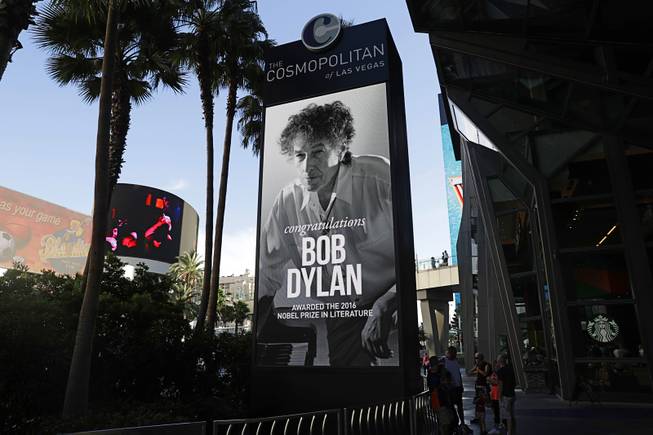
John Locher / AP
A sign outside of the Cosmopolitan of Las Vegas congratulates Bob Dylan, Thursday, Oct. 13, 2016, after he won the 2016 Nobel Prize in literature.
Friday, Oct. 14, 2016 | 1:02 a.m.
How does it feel?
On Thursday morning, the Nobel Prize committee outdid itself for surprising announcements, naming American singer-songwriter Bob Dylan the winner of the 2016 Nobel Prize in literature for "having created new poetic expressions within the great American song tradition."
The prize committee's permanent secretary, Sara Danius, called him "a great poet in the English-speaking tradition."
Dylan, 75, had been mentioned as a possible contender for the prize (which comes with a purse of about $900,000) for years. But he wasn't generally considered a serious candidate among such literary luminaries as novelists Philip Roth, Joyce Carol Oates, Don DeLillo and Margaret Atwood. And I'm just cherry-picking our own continent there; the Nobel is an international prize, and there are deserving writers all over the globe. The last U.S. writer to score the Nobel for literature was novelist Toni Morrison, way back in 1993. (Canadian Alice Munro won in 2013.)
The Nobel committee certainly has a penchant for naming winners that many American readers aren't familiar with, like Russian journalist Svetlana Alexievich last year or French novelist Patrick Modiano in 2014. Add all that up, and an international music star who has sold more than 100 million albums but written just a handful of books seems a very unlikely choice.
Before the prize announcement, British online betting emporium Ladbrokes gave Dylan 50-1 odds. A week ago, the New Republic published an essay with this headline: "Who Will Win the 2016 Nobel Prize in Literature? Not Bob Dylan, that's for sure."
Surprise!
Dylan, who is on tour and was scheduled to play Las Vegas Thursday night, had no immediate comment on the honor, a representative said. He will play at Ruth Eckerd Hall in Clearwater on Nov. 19.
But just about everybody else weighed in. President Barack Obama sent a Twitter shoutout — "Congratulations to one of my favorite poets, Bob Dylan, on a well-deserved Nobel." — with a handy link to a Spotify playlist.
Writer Stephen King tweeted, too: "I am ecstatic that Bob Dylan has won the Nobel. A great and good thing in a season of sleaze and sadness."
Not everyone was happy, of course, and some people disparaged the prize as a peak moment for baby boomers. But Lin-Manuel Miranda, no doubt with an eye to a Nobel for writing musicals sometime in the future, tweeted, "Novelists grousing about Bob Dylan's Nobel Prize: green looks hideous on you. #ThereMustBeSomethingHappeningButYouDontKnowWhat
ItIs #DoYou."
There's always grousing, of course, because there's only one prize and lots of great writers. But this time it's amped up like Dylan's legendary first electric concert at the Newport Folk Festival because he got the award for a form that isn't generally considered literary.
There's no question that Dylan, whose career spans more than half a century, has been an enormously influential musician. In his new autobiography, Born to Run, Bruce Springsteen writes, "Dylan is the father of my country," one of the main forces to shape his songwriting and that of countless others.
But is Dylan's work poetry?
Poet Jay Hopler doesn't think so. The University of South Florida creative writing professor is currently a finalist for the National Book Award for his second poetry collection, The Abridged History of Rainfall.
He calls Dylan's lyrics "sophisticated, complex, even beautiful," but says, "Lyrics are designed to exist in the contexts of musical arrangements. They are not meant to stand alone. When the musical scaffolding is removed, a song's lyrics crumble. Even Dylan's, accomplished as they are.
"Poems, on the other hand, are meant to stand alone. A poem is its own musical accompaniment. At least, it should be."
Hopler says he was surprised by Dylan's win but not dismayed. "This is a terrific opportunity to reevaluate what we mean by greatness and to think about whether or not traditional definitions of genre are even relevant anymore. They may well not be."
That might be the key to why, even though I deeply love literature, I smiled when I heard about the win. And it's a key to why Americans should be proud of it: Dylan is a quintessentially American artist.
He has always had myriad literary influences, starting way back when young Robert Zimmerman of Hibbing, Minn., assumed as his surname the first name of Welsh poet Dylan Thomas. His songs allude to Shakespeare and the Bible and namecheck F. Scott Fitzgerald and T.S. Eliot; he has cited Arthur Rimbaud, Walt Whitman, Jack Kerouac and a library's worth of other literary writers as influences.
But he has an even longer list of musical influences, from every genre imaginable. He's a painter, too, and visual artists have influenced his writing and music. And, of course, he's a voracious devourer and transformer of popular culture in general.
All of that shapes his songwriting, and in a way that may define his particular and yet very American genius. He's a master of the mashup, the sample, the genre-crossing, boundary-breaking revelation. And that's a hallmark of American art: finding creative power in diversity.
The Nobel will be presented in Stockholm on Dec. 10. Here's hoping the old trickster shows up. Maybe he'll sing Ballad of a Thin Man: "And you know something's happening but you don't know what it is/ Do you, Mr. Jones?"

Join the Discussion:
Check this out for a full explanation of our conversion to the LiveFyre commenting system and instructions on how to sign up for an account.
Full comments policy